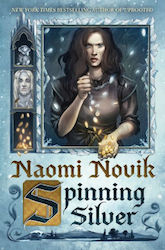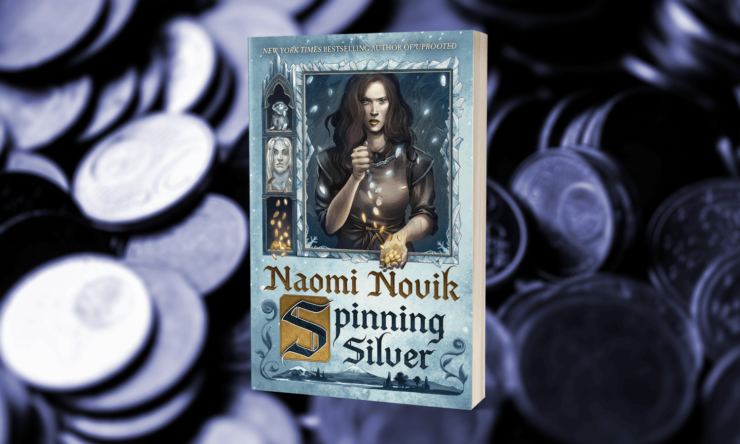In the lead-up to the 2019 Hugo Awards, we’re taking time to appreciate this year’s novel and short fiction Finalists, and what makes each of them great.
Miryem is the daughter of small town Jewish moneylender who isn’t very good at his job. Her father, while “terrible with money,” is “endlessly warm and gentle, and tried to make up for his failings: he spent nearly all of every day out in the cold woods hunting for food and firewood, and when he was indoors where was nothing he wouldn’t do to help.” But living as they do in a tiny town, “unwalled and half nameless,” where “the cold kept creeping out of the woods earlier and earlier,” where the townspeople look down upon them as pariahs, Miryem’s family is pushed to the edge of poverty, as her father eventually lends out all his wife’s dowry and is incapable of bringing any back. While Miryem’s family are on the verge of starvation, and her mother increasingly unwell, the rest of the town fares well on their borrowed coin.
But in Naomi Novik’s standalone novel Spinning Silver, “a moneylender’s daughter, even a bad moneylender’s daughter, learns her numbers,” and on seeing her mother take ill and weaken, Miryem steps up to lay claim to what is owed to her family.
“I was ready to be as merciless with our neighbours as they’d been with my father,” she says, as she hardens herself to the task she has taken upon herself, remaining unflinchingly on doorsteps until returns are made. Not everyone is able to pay back the coins they had borrowed or the interest owed, but Miryem is enterprising, and finds ways that those who owe her father money can pay her back in kind. Whether it is food or medicine for her mother, or warm furs, Miryem finds a way to recover her father’s loans from each person who owes him—and there are many. “Wrapped in [her] coldness,” she refuses to accept excuses from a man who has drunk away the money he’s borrowed, and instead arranges for his daughter Wanda to work as a housekeeper to pay off the debt. But Miryem, for all her coldness, is not unfair. Wanda is not charged with anything she is incapable of doing, is fed far better than she is at home, and finds that the prospect of a four-year stint spending days away from her violent father in the company of Miryem’s family makes her heart “glad as birds.” Wanda becomes an imperative part of Miryem’s family, and to the narrative at large.
Buy the Book


Spinning Silver
Miryem, it is soon clear, is an excellent money collector. Not just that—she’s able to “turn” silver coins into gold. Her grandfather gives her a small amount of money that she is cleverly able to use to buy things she can resell for profit, and even her far more experienced moneylender grandfather is impressed by her knack for quick, high yield investments. She begins by buying two dresses for silver and selling them for gold, and this ability to “spin” silver into gold brings a much feared mysterious Staryk stranger to her doorstep.
The Staryk are the frightening, powerful beings from a sort of parallel world to Miryem’s, a world where it is always winter. There are some physical overlaps between their world and the Russian inspired reality of Miryem’s—an actual road leads from the Staryk world into Miryem’s, which can only be opened by the king. It is the king, fascinated by gold, and greedy for the coins Miryem can earn, who shows up at Miryem’s home and demands that she turn his Staryk silver into gold three times over, or he will turn her into ice. He also makes (a possibly facetious) promise to make her his queen if she delivers the increasingly larger quantities of gold he demands, which leads to a series of events that surprise even him, though of course he is bound to keep his word. Because it seems that once she is physically in the Staryk’s world, Miryem’s abilities to change silver to gold are no longer via her business acumen but actual intrinsic magic. No need for Rumplestilskin here—the young girl herself is the one with the power to spin silver to gold.
While the story of Rumplestilskin is indeed used as a basic premise, Novik unweaves the original story, using threads of it to inspire different characters. Miryem doesn’t need someone else’s magic to prove herself worthy of a king. She isn’t the helpless young woman given away by her father to a greedy lord, the girl who doesn’t keep up her end of the bargain—she is far from helpless, and when in positions of impotency, she is quick to address the issue and attempt to take control in whatever way she can.
Novik employs multiple narrative voices in Spinning Silver, a number of perspectives making up this deftly woven and highly immersive fairy tale, with all threads connecting eventually in a satisfying way. The primary voices are of three young women—Miryem, Wanda, and Irina—each with her own fate to rewrite. Irina is the daughter of a duke, a girl whose father is constantly disappointed that she is not beautiful and may not make a good match, yet Irina finds herself somehow marrying the tsar himself, a strange young man whose cruelty she has witnessed when they were children. The tsar, however, is not an ordinary young man—not even an ordinary spoilt young noble. He has his own demons to bear, and Irina must find a way to not just save herself from him but also her people from his rule. Her story and Miryem’s and Wanda’s all tie together, as the three young women must use all their intuition and smarts to find ways out of the situations they are trapped in, as well as save many others from.
“I didn’t have a country to do it for. I only had people,” says Miryem, reminding us that this is very much also a story about Lithuanian Jews. There is plenty of anti-semitism against Miryem and her family, and while she understands that the townspeople “didn’t have a right to hate [her] but they would anyway” because she “was their monster … the one they could see and understand and imagine tearing down.”
2015’s Uprooted and Spinning Silver are not connected stories. Their similarities lie in their fairy tale impossibilities made possible, their focus on female characters with agency and the relationships they form when relying on each other. In this very atmospheric, sprawling yet so well crafted fairy tale, Novik reminds us that all we can do when faced with what seems to be inevitable doom, is to hold the ones we love close, and fight against the despair, because that “is all we can do for each other in the world, to keep the wolf away.”
This article was originally published in July 2018.
Mahvesh loves dystopian fiction & appropriately lives in Karachi, Pakistan. She writes about stories & interviews writers the Tor.com podcast Midnight in Karachi when not wasting much too much time on Twitter.











I think this was a very solid and promising novel – the first 100 pages are among the best of any fantasy novel from the last decade – which was undone by modern page count expectations. If this book had been published in the 1960s it would have been 200 pages long, won every award going and would be talked about with hushed tones today. Because it was published this decade it had to be 500 pages long when it did not have the story to support that length, so we have a very focused and tight narrative which constantly comes to a screeching halt because we have to cut away to one of half a dozen other POV characters who are in the book for no real reason and spend a lot of paragraphs discussing things like luxury apron trading.
Couple that with the fact that there’s no identifier on the POV shifts (after the excellent device of simply switching between Miryem and Wanda for the first part of the book) so you have to spend time constantly figuring out which character we’re with, and a very promising book degenerates in the middle into a bit of a slog.
Brilliant opening, solid ending, but yikes, the middle needs some serious pruning.
There’s some really awkward bits with the tsar and his various noble…I dunno, gentlemen in waiting?…that put a bad taste in my mouth. I didn’t end up finishing the book because of that, which occasionally is a regret since I loved Uprooted so much. But like @1 said, the first half of the book with Miryem and Wanda was excellent and really captivated me.
@1 That’s because the first 100 or so pages are from the novella Novik wrote for the Starlit Wood anthology. The novella is so much better than the novel. It’s sad because the novel had interesting ideas but you’re right about the middle being an aimless slog. I also couldn’t tell which character we were following whenever the narrative switched. I eventually decided it didn’t matter because none of the characters had really unique traits independent on their situations. I really wonder why this novel is in first person. I almost wonder if publishers now think YA *has* to be in first person and demand it even when a first person perspective doesn’t fit and ruins the book. Maybe it was because she didn’t want to rewrite the part of the book taken from the novella? The whole thing is such a shame. If Novik wanted to expand the story, I wish she’d chosen to maybe write sequel novellas instead, possibly two more, one from Wenda’s POV and another from Irina’s. Really could have cut down on the confusion, and having more time between the narrative shifts would have interrupted that sense of the characters being indistinct from one another.
I admit I unabashedly love this book. I thought the middle sections were needed to pull all three stories together. This is one of my favorite books. I even reread the book after seeing critiques of the switching of narrators and I still had no problem. Different strokes and all that I guess.
I love the way it looks at how women very little power find a way to use what little they have to make their lives better and how they use their intelligence and knowledge of the world to find a way to better their lives. I actually found it interesting that the book showed how women of that time really had NO say over how their lives would go and how, except for Miryem and her cousins, there was no regard for whether or not these women would be happy in an arranged marriage. I loved how each woman ended up in a good place, Wanda unmarried and a land owner, Miryem married to the Staryk king and happy about it My favorite ending is Iraina married to a Tsar who has no interest in running his country, so by default she will end up in charge AND she will do a good job of it because she cares.
To me this is a great book, and a well deserved Hugo nominee.